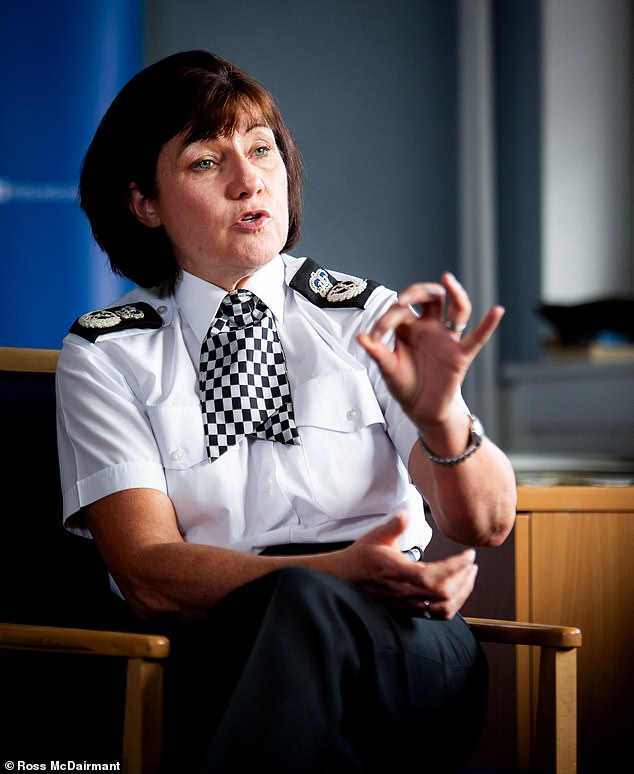Anger as Police Scotland paying officers to join gay pride marches despite major staffing crisis and controversial cutbacks to crime-fighting
- Police officers urged to attend 'highly political' events for pay or time off despite cutbacks to fighting crime
- Controversial move comes despite force facing a financial black hole and the lowest number of officers in 16 years
- Rank and file officers warn policy sets 'dangerous precedent'
Scotland's police officers will be paid to take part in Pride parades despite the force cutting back on fighting crime, the Mail can reveal.
Uniformed officers are being urged to represent the overstretched force at LGBTI marches in exchange for pay or a day off in lieu.
While hundreds will be on active duty policing the marches, senior officers have requested that other staff join the parades to show support for the marchers.
The 'astonishing' move will also see plain-clothed officers on light duties given special Pride badges.
It comes after Police Scotland shelved inquiries into minor crimes as it battles a financial black hole and the lowest number of officers in 16 years.

Police Scotland officers are being encouraged to attend gay pride marches in return for pay or time off

More than 5000 took part in "Glasgow's Pride Mardi Gla" parade from Glasgow Green, through the city centre to finish in George Square
Rank-and-file officers last night accused top brass of setting a 'dangerous precedent' by paying officers to take part in 'highly political' parades.
Calum Steele, the former general secretary of the Scottish Police Federation (SPF), said: 'Moving to a situation where officers are now paid to march (and actively encouraged with the inducement of payment to do so) is an astonishing development and has to raise questions over the effective use of resources.'
David Kennedy, the current SPF general secretary representing officers, said police participation in parades was not a priority for the troubled force.
He added: 'Whilst we fully support events like pride, Police Scotland is setting a dangerous precedent as to what events they should and shouldn't support in this manner.
'The police service is absolutely stretched; they are not answering routine calls and members of the public are having to wait over 20 minutes for 101 [non-emergency] calls to be answered.
'The priority must be to make sure that frontline resources are kept to a maximum level and are fully supported.' The revelations have appeared in an internal Police Scotland memo by Assistant Chief Constable Tim Mairs, which has been seen by the Mail.
It calls for officers to sign up to represent the force at Pride events in Glasgow, West Lothian, Oban and Stirling in the coming months.
Organised by the Scottish LGBTI Police Association, those involved will 'represent the organisation' alongside other marchers in processions through town and city centres.
The memo, which has now been widely circulated, promises officers a 'shift change or a day back will be provided for those participating in line with regulations'.
ACC Mairs' memo - sent to divisional commanders and department heads - said it was 'recognised that this [Pride] is a community engagement opportunity, therefore participation will be considered a duty day'.

Uniformed officers are being urged to represent the overstretched force at LGBTI marches in exchange for pay or a day off in lieu
He adds: '[Officers] will parade in full uniform and PPE [personal protective equipment]' and 'modified/light-duty officers [taken off the frontline because of injury or suspension] and members of staff will wear plain clothes with Pride badge (supplied) to show their affiliation to policing.' ACC Mairs said he would be 'grateful' if the contents of the memo could be brought to the attention of 'all officers/staff under your control'.
He also made it clear that 'participation numbers may need to be capped due to operational need'.
The first Pride event will be held in Glasgow on Saturday (JULY 20) and the last is in Stirling on September 21.
The new policy comes after Scotland's police chief was accused of 'virtue-signalling nonsense' when she apologised for enforcing laws which 'criminalised love'.
Chief Constable Jo Farrell said in May that she was sorry for 'recent and historical injustices' suffered by 'lesbian, gay, bisexual, transgender, queer or questioning, and intersex' people.
Cathy Larkman, who served for more than 30 years and is now the national policing lead for the Women's Rights Network, criticised the new push to have police involved in the 'highly political' parades.
She said: 'Policing a march is of course fine, as the public need to be kept safe and their rights to assemble protected.
'But in this case, officers are actually being pulled away to participate in a march.

Chief Constable Jo Farrell recently publicly apologised for 'injustices' suffered by LGBT people
'That isn't right and it's hard to envisage any other situation where that would be permitted, let alone encouraged.'
But Assistant Chief Constable Catriona Paton said: 'Police Scotland is responsible for policing a diverse community and one of our great strengths is that our officers and staff are drawn from different backgrounds and experiences.
'What unites us is our shared and non-negotiable set of values - integrity, fairness, respect and a commitment to upholding human rights.
'We value the relationship we have with all diverse groups and it is important that Police Scotland is represented at events such as these.
'Participation will be considered by line managers to ensure there is no impact on operational policing.'
Police Scotland has come under heavy heavy criticism after it emerged it was no longer going to investigate so-called 'minor' incidents.
The cash-strapped force claimed shelving rather than probing so-called lesser crimes was part of a new 'proportionate response'.
It is estimated 15,000 crimes a year may not meet the threshold for an investigation.
Frontline officers said the move would risk missing opportunities to solve crimes as politicians claimed the force was being forced to 'surrender to criminals'.
It follows a warning last year by Deputy Chief Constable Alan Speirs that 'hard choices' would have to be made to prioritise policing duties amid a major financial squeeze.





























































































































































































































































































































